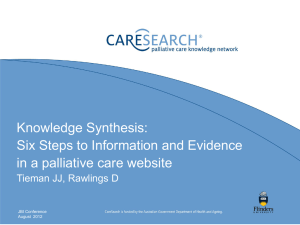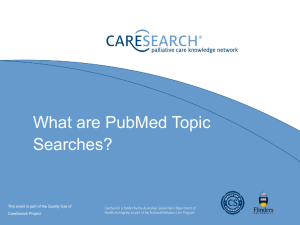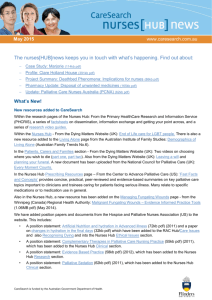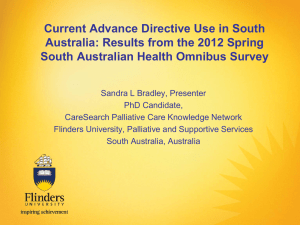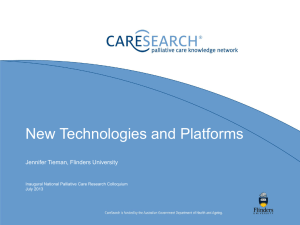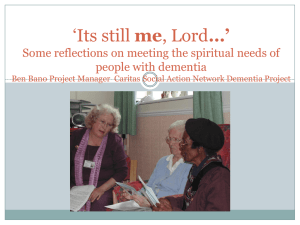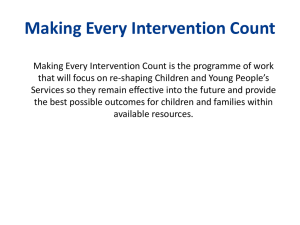Online resources supporting end of life care (5.54MB
advertisement
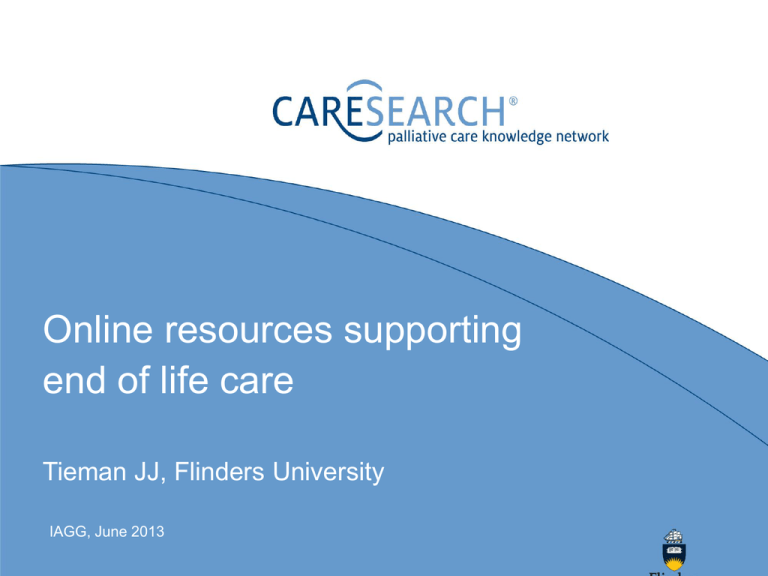
Online resources supporting end of life care Tieman JJ, Flinders University IAGG, June 2013 Outline • Palliative Care/Aged Care in Australia • Research evidence and practice • CareSearch – Development – Resources – Evaluation Palliative Care in Australia • • • • • • • Cure is not the goal of care Physical, psychosocial, care planning elements Referral based, co-morbidity, multidisciplinary Patient and family as unit of care Care provided in many settings Many health professionals Often a family carer Aged Care Considerations • • • • • • Changing demography Living and care circumstances Patterns of disease Comorbidity Triggers and transitions Population diversity The expanding evidence base • Evidence and guidance is growing. – 75 trials & 11 systematic reviews being published every day [Bastian et al, 2010] • How do individuals, services and systems know about, find, select what is important and ensure its use? – e.g. Family caregiver psychosocial and bereavement support guidelines; COMPAC Guidelines; EAPC Pain systematic reviews/guidelines About CareSearch • Palliative care resource – Evidence based, quality processes – Online – Free to use, open access – Funded by Department of Health and Ageing • Audience – Health professional – Patients, carers, families Developing the Website • Knowledge to Action (KTA) framework to guide development and review • Explicit relationship to research evidence • Formal governance arrangements • Evaluation framework • Partnership and engagement • Research activities Overview of resources • Health Professionals – Clinical Evidence: Synthesized summaries and facilitated access to the published evidence – CareSearch Hub: Information and resources for specific groups – Functionalities: Research Data Management System, Professional Connect • Health Consumers – For Patients, Carers, Family and Friends – Finding services Clinical and Evidence Resources Filter-based Searching: Easy as ABC In Hubs Patient, carer, community resources Specific Geriatric/Gerontology • Clinical Evidence – – – – – Advance Care Planning End of Life Considerations Families and Carers Specific populations Specific diseases (Dementia) • Finding and Using Evidence • Education • Professional Groups – Review Collection: Older People, Dementia, Site of Care (Residential Aged Care) – Search Filters (Dementia, Palliative Care, Residential Aged Care) and associated PubMed Searches – Web based Learning – My Leaning 4 (Residential Aged Care) & My Learning 5 (Dementia) – RAC Hub – GP Hub – Nurses Hub Evaluation Framework Framework built around 4 elements • Access • Use • Usefulness • Process Twenty evaluation activities completed to date. CareSearch: Evaluation Metrics Average monthly visits Average monthly page views No. using Research Data Management System Newsletter registrations • @CareSearch • Nurses Hub News • RAC Hub News • Allied Health Project news Published peer reviewed journal articles 40,000-60,000 200,000-400,000 636 2,895 1,533 713 297 11 Other Indicators • Partnerships – PaCCSC, PCA National Standards Assessment Program, Palliative Approach Toolkit Rollout (RAC), ANZSPM Clinical Indicators • Research – Hammondcare Dementia Search Filter, NBN Telehealth (Palliative, Aged, Clinical Rehab), Bereavement Search Filter Conclusion • Facilitates access to the evidence by: – Consolidating and synthesising evidence – One-click searching in PubMed • Supports knowledge transfer by: – Contextualising for audience • Encourages evidence use by: – Partnering with relevant agencies – Incorporating as part of different settings and activities – Promoting and disseminating CareSearch would like to thank the many people who contribute their time and expertise to the project including members of the National Advisory Group and the Knowledge Network Management Group. CareSearch is funded by the Australian Government Department of Health and Ageing. www.caresearch.com.au
